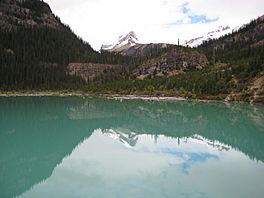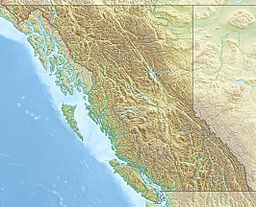Sherbrooke Lake (British Columbia) facts for kids
Quick facts for kids Sherbrooke Lake |
|
|---|---|

Sherbrooke Lake
|
|
| Location | Yoho National Park |
| Coordinates | 51°27′42″N 116°23′15″W / 51.461708°N 116.387443°W |
| Primary inflows | Sherbrooke Creek |
| Primary outflows | Sherbrooke Creek |
| Basin countries | Canada |
| Settlements | None |
Sherbrooke Lake is a beautiful lake found in Yoho National Park, which is in British Columbia, Canada. It's a popular spot for hikers and nature lovers who want to explore the stunning Canadian Rockies. This lake is surrounded by tall mountains and offers amazing views.
Contents
Exploring Sherbrooke Lake
Sherbrooke Lake is a hidden gem in the Canadian Rockies. It's known for its clear, blue water and the peaceful forest around it. The lake is a great place to visit if you enjoy nature and outdoor adventures.
Where is Sherbrooke Lake?
Sherbrooke Lake is located inside Yoho National Park. This park is a large protected area in the province of British Columbia, Canada. Yoho National Park is famous for its tall mountains, waterfalls, and beautiful lakes.
Mountains Around the Lake
The lake is surrounded by several impressive mountains. To the west, you'll see Mount Ogden, which stands about 2,695 meters (8,842 feet) tall. To the north is Mount Niles, reaching 2,972 meters (9,751 feet) high. On the east side, you can spot Paget Peak. These mountains make the scenery around Sherbrooke Lake truly spectacular.
How to Reach the Lake
Getting to Sherbrooke Lake is an adventure itself! You can reach it by following a hiking trail that is about three kilometers (1.9 miles) long. The trail starts right across from Wapta Lake, near the Trans-Canada Highway. It's a relatively easy walk, making it suitable for many visitors.
Gateway to Mountain Adventures
Sherbrooke Lake is more than just a pretty spot for a walk. It also serves as an important starting point for mountaineers. From here, experienced climbers can access the Waputik Icefield. An icefield is a large area of connected glaciers. The lake also provides access to the Scott Duncan Hut, which is a shelter for climbers exploring the icy peaks.
 | Toni Morrison |
 | Barack Obama |
 | Martin Luther King Jr. |
 | Ralph Bunche |


